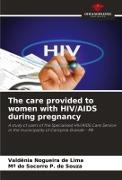Read more
Acquired Immune Deficiency Syndrome (AIDS), a disease that manifests itself in people who have contracted the Human Immunodeficiency Virus (HIV), had its first cases identified in the United States at the end of the 1970s. In Brazil, the disease emerged around the 1980s, initially affecting homosexuals, sex workers and injecting drug users. However, this profile has changed over time and currently the HIV/Aids epidemic is characterised by heterosexualisation, internalisation, impoverishment, ageing, feminisation and juvenilisation. With specific reference to the feminisation of the virus, there has been an increase in the rates of vertical transmission, which occurs from mother to child, whether during pregnancy, at the time of childbirth or during breastfeeding. The prejudice and discrimination surrounding the disease, coupled with the lack of training of health professionals to deal with the issue of HIV/Aids, means that many people living with the disease suffer stigmatisation during care. There is a need to advance the quality of comprehensive care for women's health from a humanised perspective.
About the author
BA in Social Work from the State University of Paraíba (UEPB). Curricular internship at the Specialised HIV/AIDS and Viral Hepatitis Care Service in the municipality of Campina Grande-PB, from where this publication originated.

